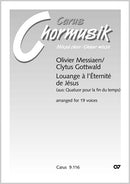| 作曲者 | Olivier Messiaen (1908-1992)・オリヴィエ・メシアン |
| タイトル | Louange à l'Éternité de Jésus |
| 出版社 | Carus・カールス |
| シリーズ名 | Carus Contemporary Choral Music |
| 楽器編成 | 混声合唱、アカペラ |
| 楽器編成(詳細) | 19 Stimmen SSSSAAAAATTTTTBBBBB |
| 品番 | M007142896 |
| 編曲者 | Clytus Gottwald |
| 難易度 | 中上級 |
| 言語 | フランス語 |
| 形状 | 12 ページ・21 x 29.7 cm・36 g・表紙カバー無し |
| 演奏時間 | 8分 |
| 作曲年 | 1992年 |
| 出版年 | 2002年 |
| 出版番号 | CV 09.116/00 |
| ISMN | 979-0-007-14289-6 |
| サンプル | https://www.carusmedia.com/images-intern/medien/00/0911600/0911600x.pdf |
In contrast to earlier arrangements, which were based on vocal models, in the present case an instrumental piece, the fifth movement from Olivier Messiaen‘s Quatuor pour la fin du temps was used as the starting point here. Admittedly the title of this movement, "Louange à l’Eternité de Jésus" suggests something entirely vocal, in that the instrumental Alleluias figure in Messiaen‘s works as speechless exclamation, e. g., in Les Couleurs de la Cité céleste. If in the gregorian Alleluias the instrumental aspect is molded in the shape of speechless utterance, thus works, such as the present movement from the Quatour, refer to the vocal aspect of its origins. Therefore a vocalization of this model had to emanate from such ambiguity. This means there was a text to be underlaid as in a gregorian Alleluia which enabled the singers to articulate the material to be sung without defining any form. In searching for a text which neither told a story, nor reflected one I came upon Messiaen‘s own text or, more precisely, that which he had composed for his Trois petites Liturgies de la Présence divine: "Mon Jésus, mon silence, restez en moi , mon Jésus, mon royaume de silence, parlez en moi …" (My Jesus, my silence, reside in me, my Jesus, my kingdom of silence, speak to me). It reflects just that ambiguity which can also be observed in Messiaen‘s music: It indicates and signifies nothing, and yet it articulates something, seeking with the help of concepts to go beyond a system of concepts – not in the form of a philosophical endeavor, rather in the form of stepping out of oneself. Not for nothing did the original performance marking of the fifth movement of the Quatour is indicated as "Infiniment lent, exstatique." (from the foreword by Gottwald)



